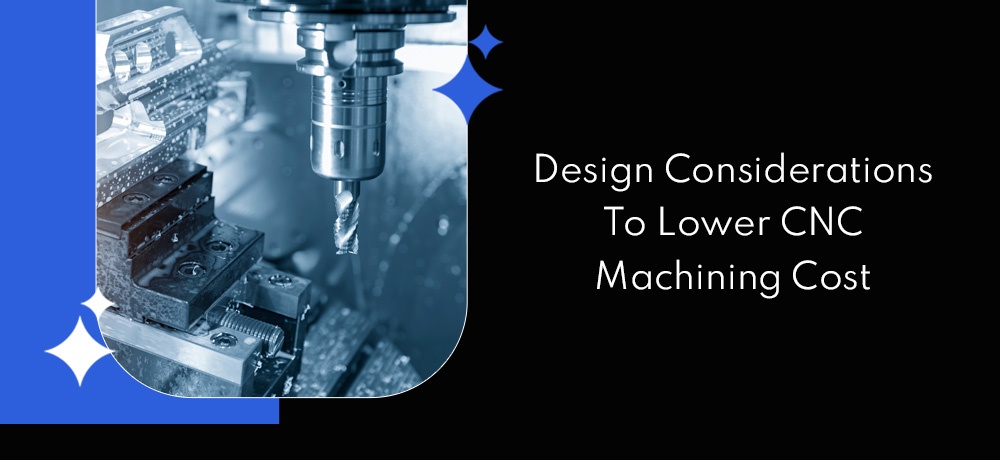Design Considerations To Lower CNC Machining Cost

In diverse industries, including marine, aerospace, automotive, and medicine, CNC machines are becoming more popular as a tool for manufacturing intricate and complex parts. For production parts and prototypes, CNC machining can be an efficient manufacturing method. However, it loses its cost-effectiveness when the key design details and machining capabilities are not balanced.
So, to make CNC machining more cost-effective, Affinity Manufacturing Ltd. highlights a few tips you can incorporate into your part design. Keep reading to know more.
1. Don’t use sharp internal corners
Sharp internal corners are hard to obtain due to the circular nature of CNC drill bits. When trying to achieve an internal sharp corner, the drill bit will be unable to machine a small pocket of space, leaving an internal corner radius. Workarounds for this issue include using specialized tools or electrical discharge machining (EDM); however, it will come at a higher cost. To minimize the machining time and cost, avoid sharp internal corners whenever possible.
2. Only define tighter tolerances when it is necessary
Since tighter tolerance requirements increase the machining cost, it is important to reserve tight tolerances for when they are absolutely necessary. Where tolerances are not specified on the design, CNC machines use a standard tolerance, normally ± 0.125mm or better, which is acceptable for most features. Additionally, keep your tolerances as homogenous as possible to further cut down machining time and costs.
3. Consider the material price
The cost of your CNC machined parts is heavily influenced by the current wholesale market price of your requested material. Typically, Aluminum 6061 is the primary choice for metal prototypes due to its machinability and low cost. However, materials such as C360 brass and stainless steel 303 will provide a higher degree of machinability but at a higher cost, making them a better fit for larger volume production. As a result, economies of scale play a large part in reducing the per-unit cost for large volume productions that use premium materials. Ultimately, choosing a material with a low wholesale price and leveraging economies of scale whenever possible will help minimize costs.
4. Economies of scale
Building on our last consideration, taking advantage of economies of scale cannot be emphasized enough. Start-up costs encompass a large proportion of CNC machining costs, especially when dealing with small quantities. Because of this, we see a significant drop in per-unit costs as the quantity increases. This is due to the start-up costs being spread across a larger number of units, ultimately driving down the per-unit cost considerably. These cost savings from economies of scale are experienced even from very small changes in quantity. Going from one unit to five can cut the unit price in half in many cases, whilst quantities in the thousands can reduce the unit price by a factor of five to ten. All in all, leverage economies of scale by ordering higher quantities to minimize your cost.
5. Design with setups in mind
When focusing on reducing costs, it is important to consider the machine setups associated with your part. Rotating and repositioning a part multiple times must be done manually or with multi-axis CNC machines, which will typically drive up the manufacturing cost. Additionally, complicated geometries may increase setup costs associated with custom jigs and fixtures. Ideally, you want to design a part that requires as few setups as possible, when prioritizing cost savings.
6. Keep it simple
Keep it simple. An easy way to lower your part costs is to keep your design as simple as possible. With simpler designs come reduced machine time and costs. Of course, it may not be possible to necessarily design your part “simple” when working with complex parts; however, it’s important to design your part with its core functionality in mind to avoid the costs associated with machining unnecessary features in your design.
If you’re looking for a CNC Machine Shop in Vancouver, BC, reach out to Affinity Manufacturing Ltd. We have been serving the industry since 2000 and are focused on customer satisfaction. We have a comprehensive state-of-the-art facility capable of handling miniature components to large mechanical parts and assemblies. We serve across Surrey, Vancouver, Richmond, Coquitlam, Abbotsford, Chilliwack, Burnaby, Squamish, Seattle, and the surrounding areas.
Get in touch with us today!
To learn more about the services we offer, please click here. To get in touch with us, please click here or call us at +1 (604) 591-6667 or email us at info@machining.ca.



